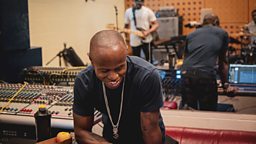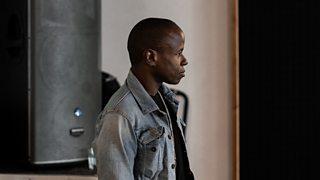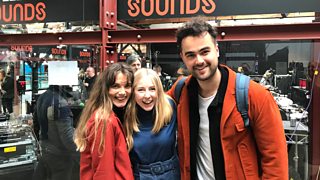What does a music director do?
Kojo Samuel is one of pop music's leading music directors, having worked with the Sugababes, Jess Glynne, Dave, Rita Ora and Rudimental. He was also the man behind Stormzy's headline-grabbing set on the Pyramid stage at this year's Glastonbury, but even he didn't always know what a music director did.
-
![]()
Listen to Front Row from Βι¶ΉΤΌΕΔ Introducing Live
Sarah Gosling is joined by blues folk duo Ferris & Sylvester, Kojo Samuel and composer Tom Foskett-Barnes.
"I didn’t know what it was until about 10 years ago," Samuel admits on Front Row's special from the Βι¶ΉΤΌΕΔ Introducing Live weekend. "I kind of fell into it, awkwardly. I grew up wanting to write and produce music and make music, and the first half of my career was doing that."
Samuel's mother is the legendary soul singer PP Arnold, while his dad played bass for Crosby, Stills and Nash, so music was an inevitable career path. "I was always a musician; I was always a keyboard player," he says. "You realise quickly – anybody that’s been in a band knows – that somebody needs to organise this! When you have four and five people, everybody just playing what they want to play, doing whatever they want to do, somebody has to arrange it, and organise it, and steer the ship a bit. I realised there was this role that existed in pop music that was that music director."

So what does the job involve?
“I guess in its simplest term, a music director is someone who helps transform a recorded piece of music into a live performance," Samuel explains. "So that is everything from deconstructing a record and then trying to imagine how that’s going to be performed live. You have to think about the personnel, the instrumentation, technology behind that, how you’re going to bring all that together. He then helps facilitate bringing the right team around them."

Once Samuel gets everybody in place his job turns to creating a show. “Your job is then to make decisions on how to actually do the performance, how to actually make it work and how to make the record sound impactful and special and how to make a special moment out of the performance,” he says.
"Your job is actually to help the artist realise their vision. It’s not about necessarily your vision: it’s about their vision. That’s the first part, but then the other part is then rehearsing that band and the artist and the musicians and that’s the more creative side of it. Then you become part producer, part composer, part arranger," Samuel says. "That’s the part that’s actually, for me, the more interesting part, because you might know people, but what are you gonna do with them? What are you actually going to do on this stage? That has to be figured out!"
The man in the middle
"The music director is then the buffer between the artist, the band and also the label," Samuel explains. "Everybody has views, everybody has ideas and somebody has to be a focal person in the middle of it to see everybody’s side of things."
Weighing up competing interests to make the show work for everyone is crucial. "The record label might want it to sound exactly like the record, the artist might decide: ‘I want to do this completely different approach or different version of the song,' and my job is to see what the artist wants, also know what the label wants and find some way of meeting in the middle and make it work for everybody."

So how was working on that Stormzy show at Glastonbury?
"It was a highlight; it was an amazing moment for everybody involved," Samuel says with pride. "Thankfully it really seemed to touch a chord with a lot of people. Nobody knew what to expect from him, doing a performance on that scale, on that platform. It could have easily not gone well! But a lot of work went into it and he in particular had an ambition of what he wanted it to be. All the team had an idea and an ambition about what they felt it could be and a lot of hard work went into making it.
"He’s an amazing performer but you wouldn’t expect him to be on the Pyramid stage so something had to be proved," Samuel states. “I think that everybody tried to make it a special event and a special moment for British music.”
Listen to Front Row's special from Βι¶ΉΤΌΕΔ Introducing Live on Βι¶ΉΤΌΕΔ Sounds
More from Front Row...
-
![]()
Emilia Clarke on Last Christmas
The Game of Thrones star on her festive film inspired by the songs of George Michael.
-
![]()
War Of The Worlds re-imagined
Writer Peter Harness talks to Front Row about his Βι¶ΉΤΌΕΔ TV adaptation of the HG Well sci-fi story.
-
![]()
Six, a musical about Henry VIII
Front Row reviews the musical which started out as a student production in 2017 and is now a transatlantic phenomenon.
-
![]()
Northern Ballet at 50!
Artistic Director David Nixon discusses his love of telling stories through dance.





